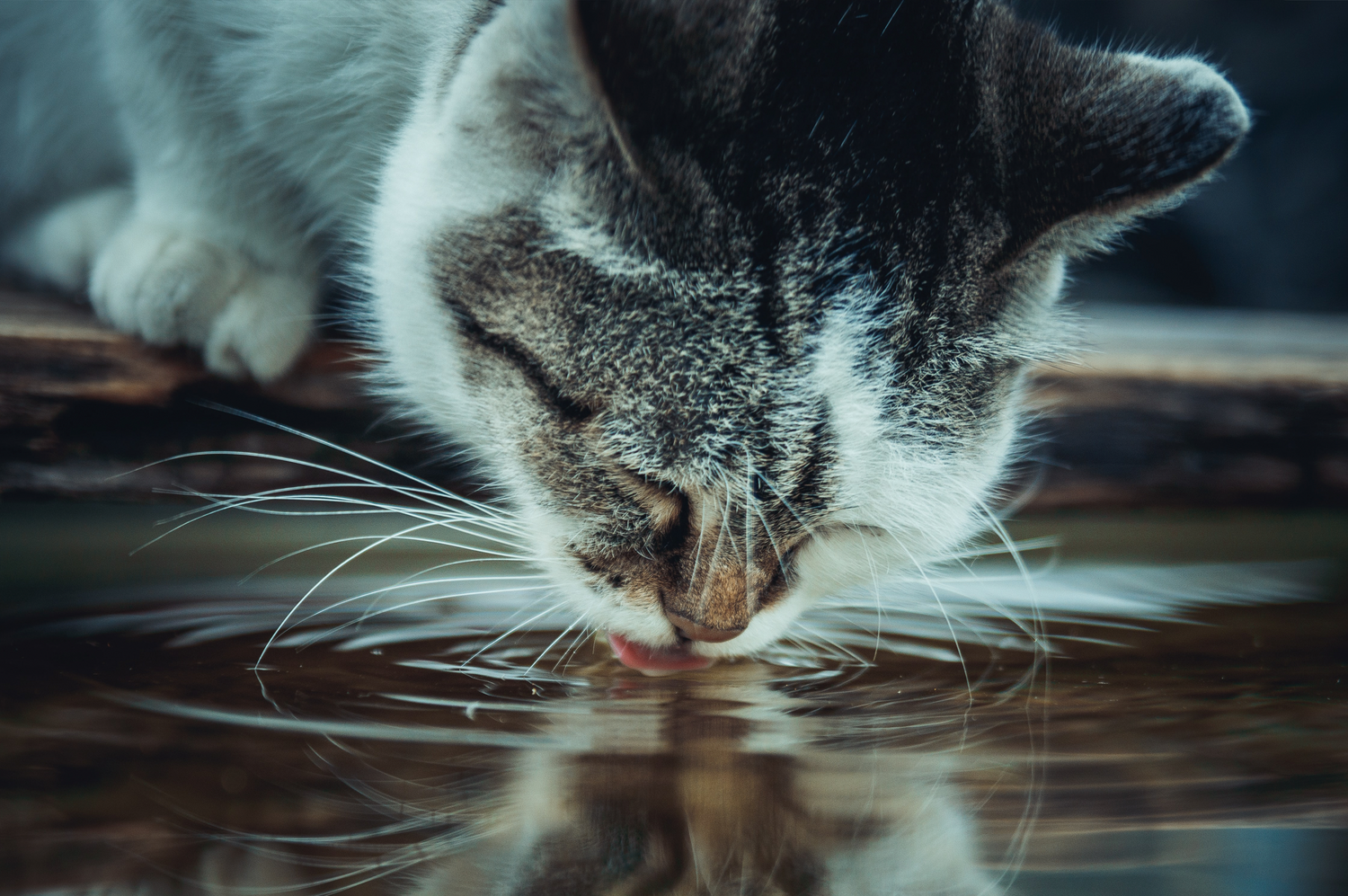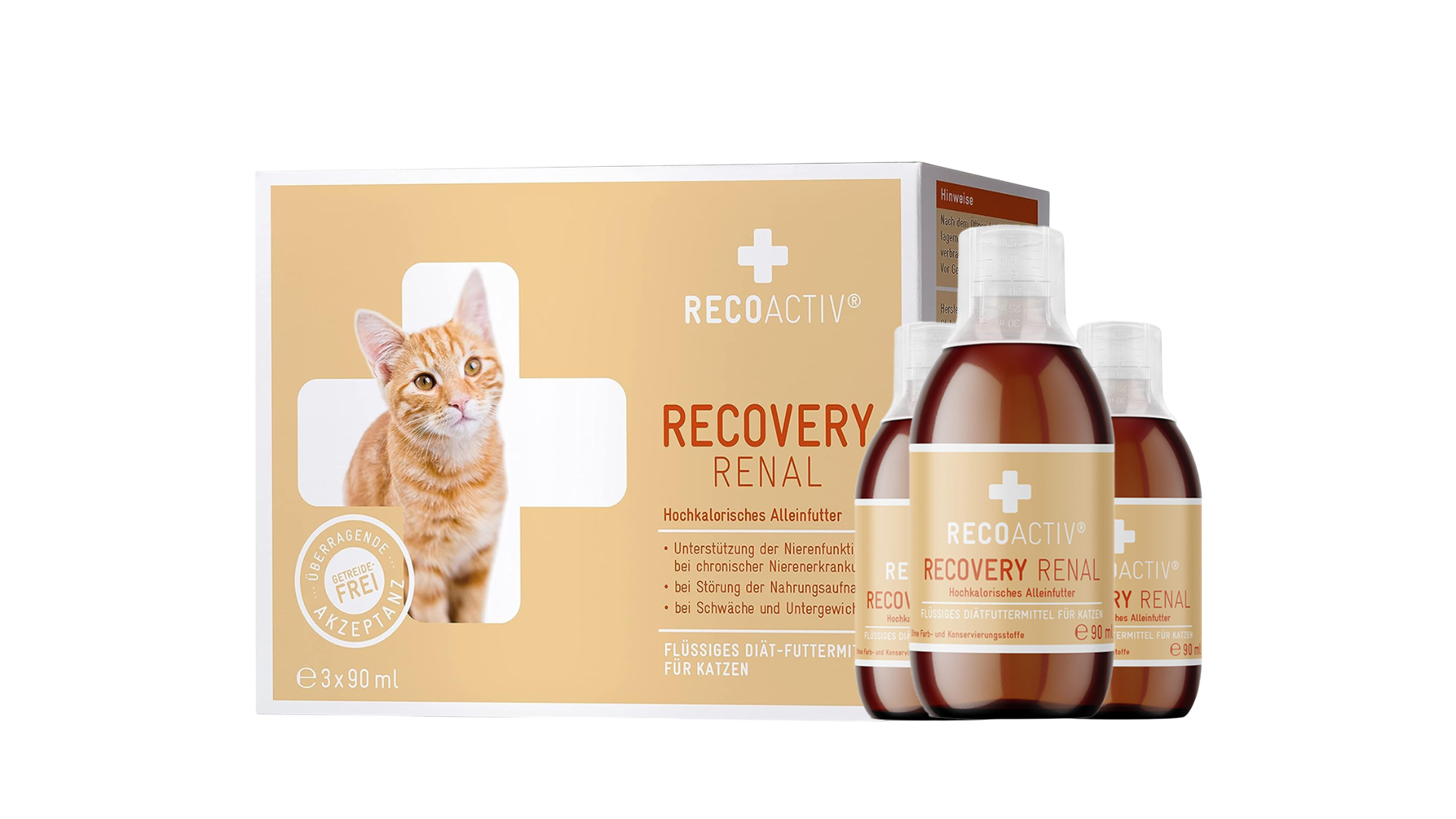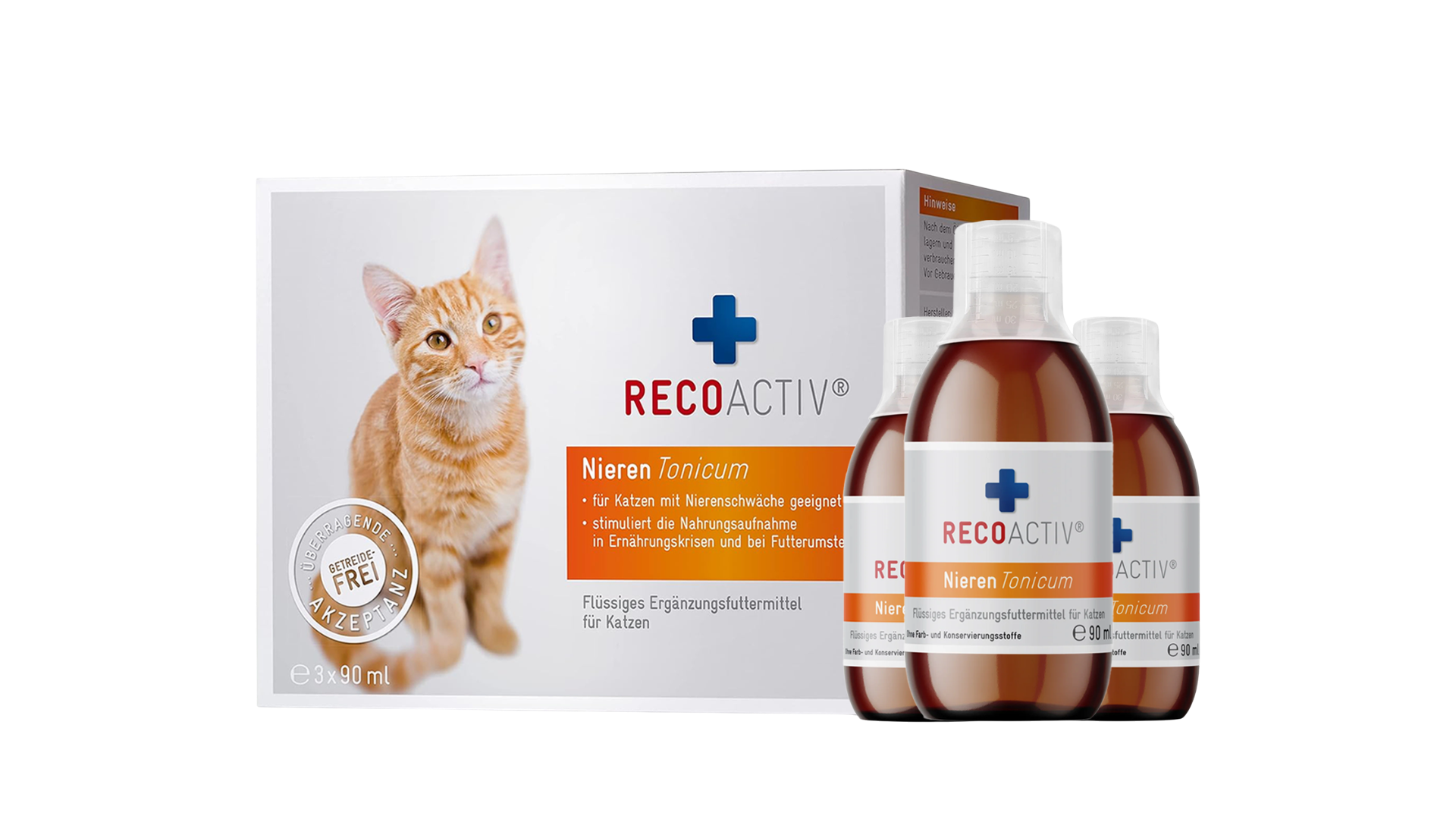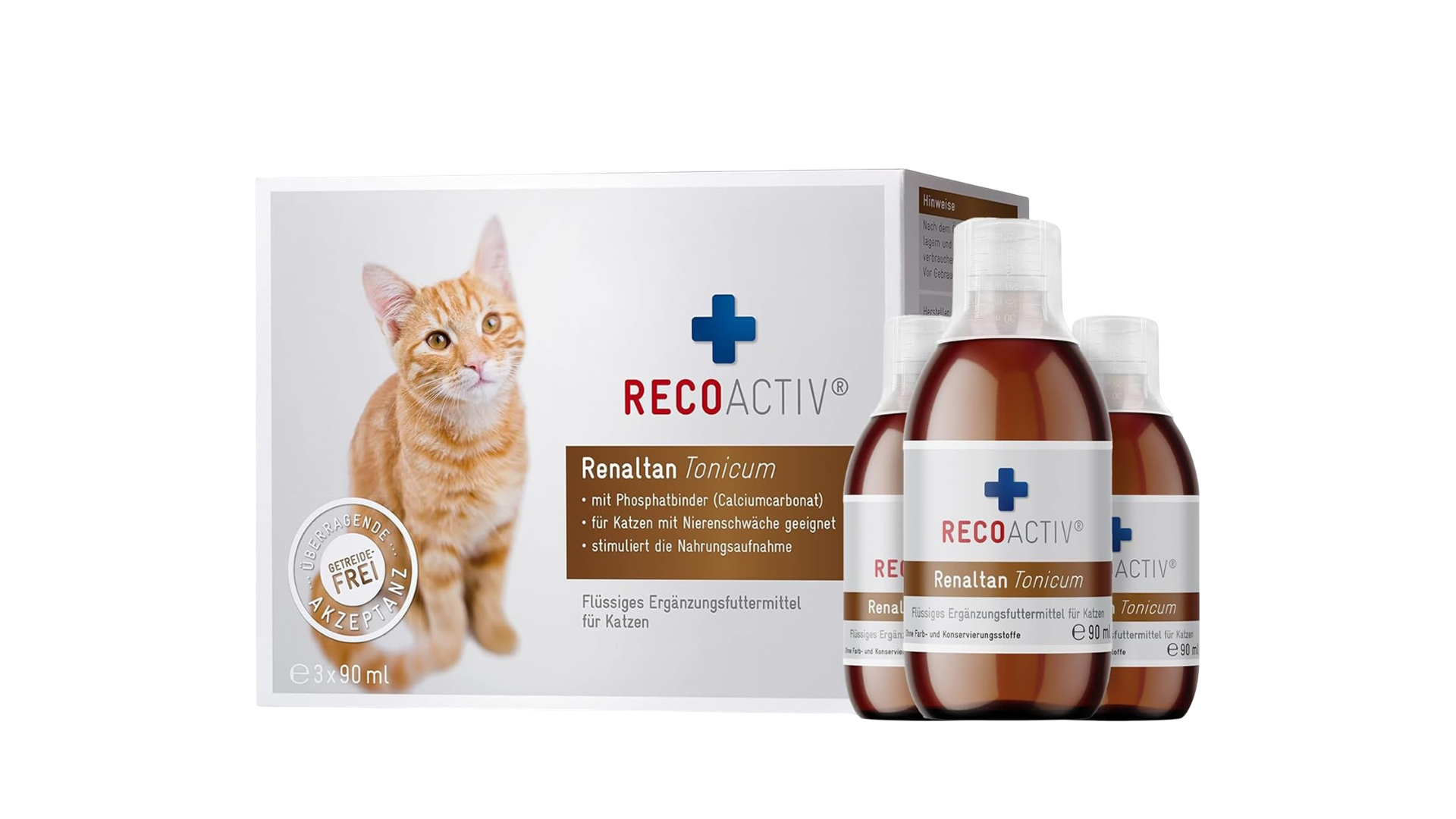What are the most important functions of the kidneys in cats?
Many cats that are ten years old or older suffer from chronic kidney disease. Consequently, treatment of affected animals is quite common. A key aspect of this treatment is a special renal diet.
In this article, we explain everything from the first signs to the treatment of kidney dysfunction and the available options.
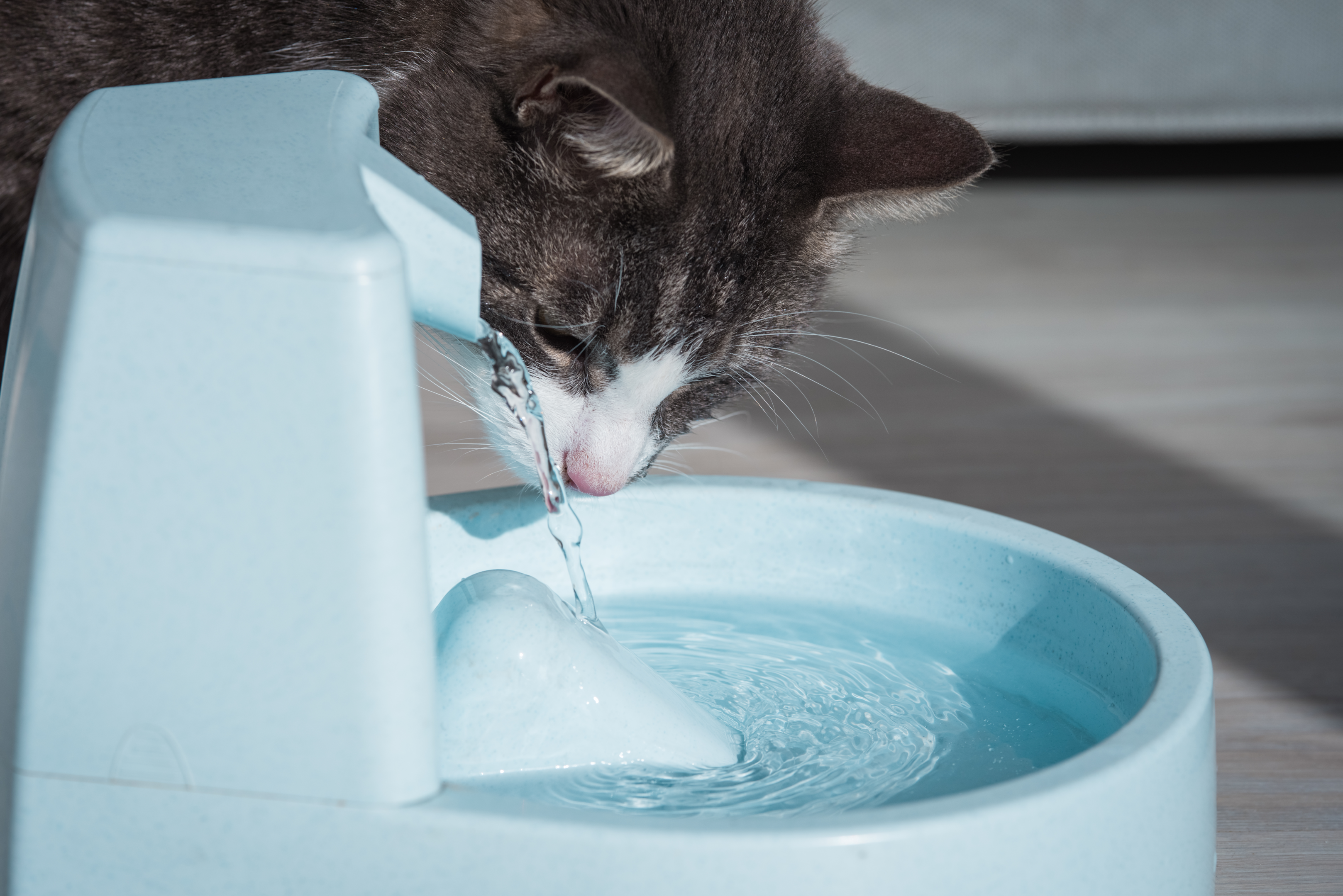
What are the most important functions of the kidneys in cats?
The kidneys are vital organs whose main tasks are to ensure the body's fluid balance, to filter waste products from the blood, and to produce important substances for calcium balance and blood pressure.
The kidneys are vital organs that perform a variety of functions in the body. These include:
- Ensures the balance of the body's own fluid levels through excretion via urine.
- Filter that removes waste products from the blood, but leaves important substances in the body
- Production of various substances that are important for calcium balance, blood pressure and red blood cell production.
Like humans, cats have two kidneys . Both are bean-shaped and about three centimeters in size . A kidney consists of thousands of tiny functional units called nephrons. Their job is to filter the blood, which is constantly circulated through the kidneys.
When a cat is young and healthy, not all nephrons are active. Many serve as so-called reserve units , which are only needed when others cease to function. As cats age , kidney damage often occurs. Even without this, some nephrons die off over time. The reserve units then take over their functions until all nephrons are working again.
If the damage to the kidneys continues, the first signs of chronic kidney failure may appear in the cat.
What exactly happens in the kidneys in chronic kidney disease?
In the case of chronic renal insufficiency, the diseased functional units (nephrons) fail, leading to an overload of the healthy units and ultimately a loss of the ability to regulate urine composition.
In the case of kidney failure, the diseased nephrons cease functioning and thus lose their crucial ability to regulate urine composition . As a result, the remaining healthy nephrons suddenly have to work much harder, since their workload doesn't decrease. This often leads to overload , ultimately causing them to fail as well. This also explains why, if left untreated, chronic kidney disease often worsens over time .
What causes chronic kidney disease in cats?
The causes are varied and range from poisoning (e.g. by antifreeze or lilies) and infections to congenital diseases (PKD), kidney stones, autoimmune diseases, tumors to malnutrition (phosphorus deficiency).
If a cat develops chronic kidney disease, there can be various causes. To provide the best possible care for the cat, it is important to understand these causes or to be able to rule out certain reasons:
- Medications
- Poisonings that can occur from lilies, antifreeze, pesticides, herbicides and solvents
- Infections
- Heavy metals
- Kidney infection
- Congenital kidney diseases, such as PKD (Polycystic Kidney Disease)
- Urinary retention due to kidney stones
- Kidney stones
- Autoimmune diseases
- Diseases of the immune system such as FIP (Feline Infectious Peritonitis)
- Tumor in the kidney
- Phosphorus deficiency due to improper feeding
Acute kidney disease is often caused by insufficient blood flow to the kidneys . This can happen when cats lose a lot of fluid due to dehydration, shock, or severe blood loss, for example, following an accident. In such cases, the kidneys can no longer be adequately supplied with blood, ultimately causing them to cease functioning for a period of time.
In this case , veterinary help is absolutely necessary so that the cat's kidneys can function again as quickly as possible. Otherwise, chronic kidney disease could develop.
What is the difference between acute and chronic kidney disease?
Acute kidney disease is a recent condition with a high probability of full recovery with appropriate treatment. Chronic kidney failure, on the other hand, persists for a longer period (two months or more), is incurable, and leads to the irreversible formation of connective tissue ("shrunken kidney").
If a cat has acute kidney disease , it means that it has only recently developed. If the disease is then treated properly, there is a high probability that the kidneys will fully recover .
If the cat has been ill for an extended period , it is considered chronic kidney failure . In many cases, this has already been present for two months or more at the time of diagnosis. Unfortunately, the exact cause is often no longer identifiable , and regeneration of the damaged tissue is no longer possible. The cat's body replaces it with connective tissue . This can be visualized as the formation of a scar. The affected kidney becomes smaller as a result, which is why it is also referred to as a "shrunken kidney."
If left untreated, kidney insufficiency can progress and ultimately lead to kidney failure . This must be countered with targeted treatment. This is usually achieved through a special renal diet , which can halt the disease or at least slow its progression. A kidney supplement for cats is also often beneficial. The cat then benefits from a significantly improved quality of life.
What symptoms occur in chronic kidney disease?
Chronic renal insufficiency manifests itself through symptoms such as weight loss, loss of appetite, frequent drinking and urination, dehydration, increased need for sleep, dull coat and bad breath, although these only become clearly apparent in advanced stages (stage III and IV).
In cats with chronic kidney disease , different stages and associated symptoms can develop gradually. These stages are classified from I to IV.
- Stage I – without clinical signs: The cat appears outwardly healthy and there are no signs of the disease.
- Stage II – few clinical signs: While some cats develop initial symptoms at this stage, others show no signs of the disease at this time. Possible symptoms include frequent urination and increased thirst.
- Stage III – clinical signs increase: Only at this stage are clear signs such as frequent drinking and urination, loss of appetite, weight loss, vomiting, dull and unkempt coat, dehydration and weakness recognizable.
- Stage IV – severe clinical signs: The cat's body suffers from internal poisoning due to toxic metabolic byproducts. This can lead to severe vomiting, nausea, loss of appetite, weakness, lethargy, and dehydration.
Chronic kidney disease often manifests itself in cats through the following symptoms:
- weight loss
- Loss of appetite
- Unusually frequent drinking and urination
- Dehydration
- Increased need for sleep
- Dull and unkempt fur
- Bad breath
- weakness
These symptoms can also occur with other illnesses , so they are not a definitive sign that the cat is suffering from chronic kidney failure. A sudden refusal to eat in cats can also have other causes. It is important to observe the cat closely. If the symptoms worsen or new ones appear, a visit to the veterinarian is essential.
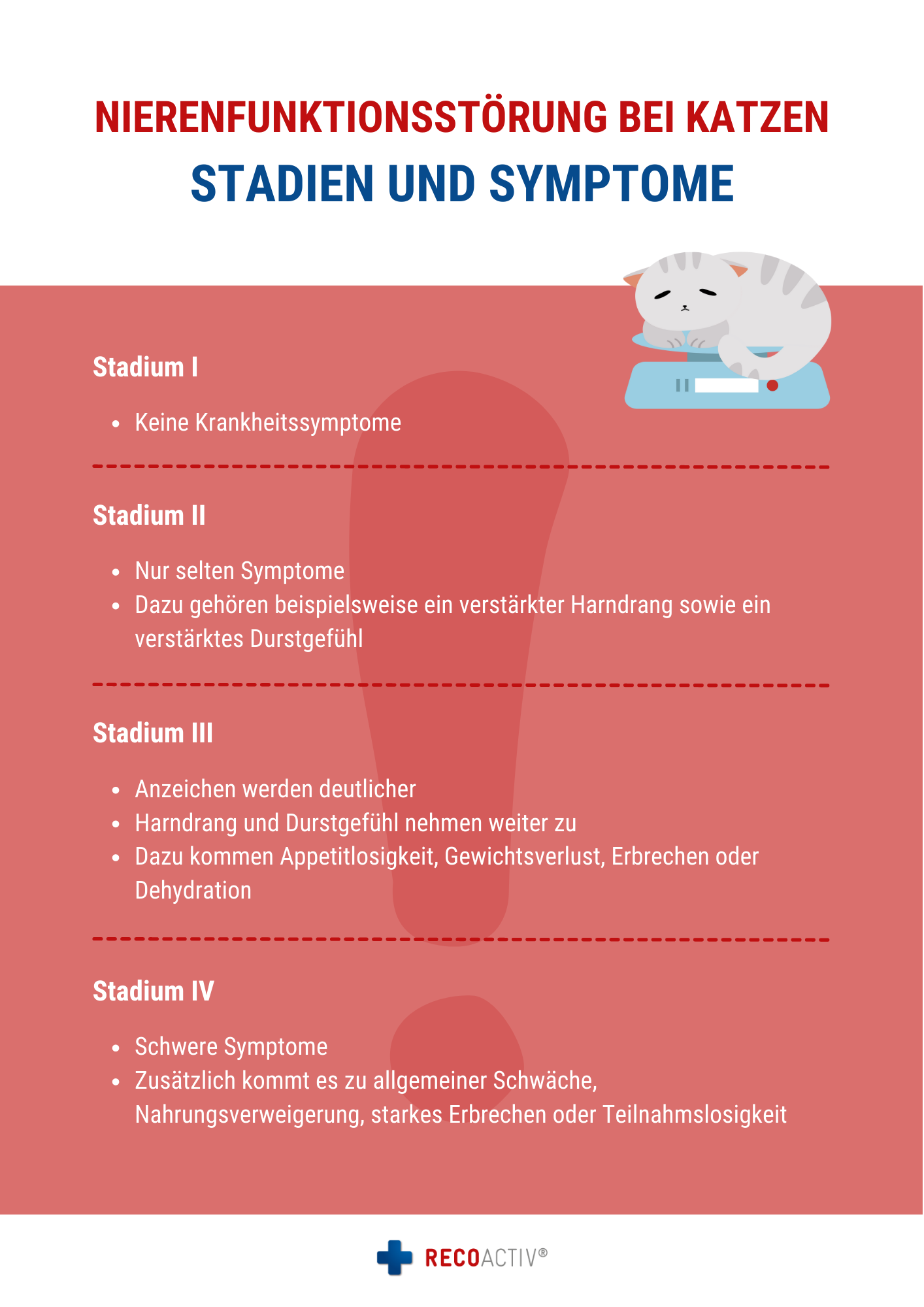
How is chronic kidney disease diagnosed?
The diagnosis is made through blood tests (SDMA, urea and creatinine levels), urine tests (reduced concentration, increased protein excretion) and ultrasound examinations (detection of shrunken kidneys).
Veterinarians can diagnose chronic kidney disease through various examinations:
- Blood test: This determines the level of waste products in the cat's blood. SDMA, urea, and creatinine levels are crucial for this assessment. The SDMA level rises even with a 30 percent reduction in function, while urea and creatinine levels are only elevated with approximately two-thirds of the impairment. Advanced insufficiency is characterized by anemia, acidosis, and elevated phosphorus levels.
- Urine test: This often reveals that the urine is no longer properly concentrated. In addition, there is an increased excretion of protein in the urine.
- Ultrasound examination: Cats with chronic renal insufficiency often have shrunken kidneys, which can be detected by an ultrasound examination.
What are the consequences of kidney disease in cats?
Impaired kidney function can have far-reaching consequences, including inadequate supply of nutrients (e.g., minerals), high blood pressure, dehydration, disturbances in phosphate/calcium balance (hyperparathyroidism), and in advanced stages, impairment of vision and kidney calcification.
- Inadequate supply of various nutrients, for example minerals
- High blood pressure
- Dehydration
- Overactivity of the parathyroid gland and consequently disturbances in phosphate/calcium balance
- Visual impairment in advanced stages
- Kidney calcification
What is the optimal treatment?
Treatment is based on early diagnosis and aims to prevent progressive damage. Key aspects include switching to a special renal diet (less salt and phosphorus, high-quality proteins), ensuring adequate water intake (possibly with a drinking fountain), and, if necessary, medication prescribed by a veterinarian.
Once kidney cells are damaged, they cannot regenerate . This makes early diagnosis all the more important. In this case, cat owners can actively counteract further organ damage.
The first important step is to change the cat's food . The cat should now consume less salt and phosphorus and needs high-quality, balanced proteins . Special renal diet food meets these requirements and thus offers the best foundation for a successful dietary change. However, some cats don't accept it well at first. In such cases, the use of a kidney tonic , like the one we offer at Recoactive, is advisable.
Kidney disease can cause dehydration in cats. Therefore, it's essential to always provide them with plenty of fresh water . However, some cats aren't sufficiently motivated to drink from stagnant water in their bowls. In this case, drinking fountains , available at pet stores, can be helpful. Because the water is constantly moving, it doesn't get stale as quickly.
Alongside these measures , medication may be necessary. However, this will be determined by a veterinarian. Cats receive pharmaceutical support for dehydration, blood pressure, and in cases of nutritional deficiencies.
What are the prospects for successful treatment?
If age-related kidney damage is diagnosed, the cat can still live for several years with good care and consistent adherence to all veterinary recommendations.
If a cat is diagnosed with age-related kidney damage , it can still live for several years. However, it is crucial that the cat receives good care and that all veterinary recommendations are followed. Sick cats should be closely monitored and examined regularly so that medication can be adjusted as needed.
It is also important to weigh the sick cat frequently and monitor its food and water intake . This information helps veterinarians keep track of the cat's progress and adjust the treatment accordingly.
The treatment of the sick cat takes place not only during regular veterinary visits, but above all in everyday life !
What should be considered when following a kidney diet?
The renal diet is crucial to halting the progression of the disease and is characterized by low-phosphorus food with fewer, but high-quality, balanced proteins to relieve the weakened kidneys.
To slow the progression of the disease as much as possible, proper nutrition is crucial for the cat . She now needs a special renal diet , characterized by low phosphorus content . This diet also contains less protein than regular complete cat food. This ensures that the diseased, weakened kidneys don't have to work as hard. An additional phosphate binder helps to bind the phosphate.
Snacks and vitamin supplements often contain ingredients that can cause further damage in cats with kidney disease. Therefore, we strongly advise against giving them to your cat without first consulting a veterinarian. It is especially important for cats with kidney failure to have a diet tailored to the severity of their condition .
Not every cat will accept the special diet food immediately. In such cases, it's important to gradually introduce it or make it more palatable. It might help to mix a small amount of the special diet food with the cat's regular food each day. Then, the proportion of regular food should be gradually reduced . Adding a little tuna oil or small pieces of cooked meat can also help to encourage the cat to eat the food. If the cat still refuses the food, a return visit to the veterinarian is essential.
How can water intake be encouraged in cats with kidney disease?
Fluid intake can be encouraged by placing the water bowl in a quiet, clean location (not next to the litter box), distributing several drinking bowls, using drinking fountains, or mixing water into the food if the cat refuses to drink.
Cats are often poor drinkers by nature. However, you can still encourage them to drink regularly. It's important that the water bowl is placed in a quiet location and is cleaned or replaced regularly . Especially during the warmer months, algae quickly accumulate in stagnant water. The water bowl should also not be placed directly next to the litter box .
It is advisable to place several water bowls around the apartment for the cat . This corresponds to their natural drinking behavior and can pique their curiosity. If this doesn't help, so-called drinking fountains for cats are recommended.
If the cat generally refuses to drink water, it should be mixed into its food. Regular intravenous fluids may also be necessary, which is essential if the cat's illness is already advanced. In any case, it is crucial to ensure that toxins are flushed from the cat's body .
For cats that generally drink and eat poorly, an appetite-stimulating dietary supplement can be used preventively.
What kind of help is needed in an emergency?
In acute cases, often caused by dehydration, the cat must receive an electrolyte infusion as quickly as possible at a veterinary practice; at night or on weekends, the on-call service should be contacted.
If you notice that a cat with kidney disease has suddenly become very ill, dehydration is often the cause. To counteract this as quickly as possible, the cat needs an intravenous fluid containing electrolytes . This should be administered by qualified veterinarians.
If an emergency occurs on the weekend or at night, you must contact a veterinary practice or veterinarians who are on call . Regularly required infusions can also be administered at home . However, you should have the exact procedure explained to you thoroughly.
Frequently Asked Questions (FAQ) about kidney dysfunction in cats
How does a cat behave when it has kidney problems?
During the course of kidney disease, cats may experience a decreased appetite or refuse food. Even if the cat eats regularly, weight loss is possible. Affected cats often have a dull and unkempt coat, an increased need for sleep, and exhibit weakness and lethargy.
How long do cats with kidney problems live?
It can take months or even years for cats to reach the end stage of chronic kidney failure. Life expectancy varies from animal to animal.
Does a cat experience pain if it has kidney disease?
Pain from kidney disease often only appears in advanced stages. However, a cat's gums may become sensitive due to kidney problems. She will notice this particularly when grooming herself and will likely stop doing so at some point.
What to do if kidney function is poor.
If a veterinarian detects poor kidney function in a cat, appropriate treatment must be initiated. This may require medication and/or a renal diet.
Conclusion
The kidneys are vital organs. However, many cats develop serious kidney problems as they age. Frequent urination and thirst can be early signs. Other possible symptoms include lethargy, a dull coat, and other signs of kidney problems. The cat should then be closely monitored and taken to a veterinarian for further examination.
If kidney failure has already become chronic, it can no longer be cured, but its progression can be slowed. The right diet plays a crucial role in this. In the Recoactive online shop, we offer a special kidney tonic that can help cats with kidney problems. Among other things, it provides support when switching to a special renal diet.

